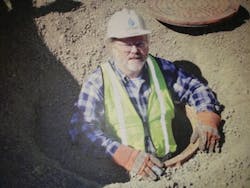About the author:
David Drake is vice president of Smart Cover Systems and the 2020 WWD Industry Icon. Drake can be reached at ddrake@smartcoversystems.
Recently I met with my cardiologist. He presented generally good news, and we had a few minutes to chat. I asked him about their morbidity and mortality or M&M process (not to be confused with I&I).
He is a member of a fairly large medical group, and I assumed they convened for M&M sessions. These conferences have been a part of medical practice since the early 20th century. The doctors gather together in private with no attorneys or onlookers. A senior doctor will have selected certain cases for review. These are typically cases with adverse outcomes: a surgery gone wrong, missing sponges, post-operation infections, skill lapses, etc.
The M&M conference is not punitive but is intended to speed up and complete the process of improvement. It also provides a way to validate and to communicate findings widely in the medical community, without filtering. His question to me was “Why do you ask?” I told him I am always fascinated by the process of urgent and critical decision making, especially with limited knowledge. M&M is a good vantage point to view how those life and death decisions are made.
At the Caltech/NASA Jet Propulsion Laboratory we had a similar process in design and fabrication. It was the Red Team review. The Red Team would be the Devil’s Advocate in alignment with Murphy’s Law, Mother Nature and capricious chance. The Red Team also considered design tradeoffs, judgment calls, arithmetic accuracy, assumptions and estimates of the unknown. A critical part of any system-integration effort is the integrity of the interface between key players.
In the case of the Mars Climate Orbiter (MCO), in 1999, the JPL staff designed the spacecraft using metric units, while Lockheed had traditionally used the “English” system. At a critical point, these solutions did not mesh and the MCO had an “adverse outcome.” This led to all contracts being transitioned to compulsory metric scales. If you disagree with that solution, please, without Googling, define how many teaspoons of material are in a hogshead?
In the chaos of a tumultuous administration transition, there are myriad priorities, directions, missions and goals to be addressed. That is just for the little stuff. In major national endeavors, the problems are exacerbated by the size, complexity and conflicts found in the details. This is deeply true in the water and wastewater industry, so where and how do we proceed? Everyone has an opinion, but can we find agreement on just one thing?
It has to have a significant impact, be of general benefit, have been tried over the years, but has failed to consummate. Like the canonical Apollo program, it must have a well-defined and understandable goal. It would help if there have been previous, successful completions on a smaller scale to encourage the effort.
If we take the examples of the former processes, nationally the wastewater industry does not concur on the process of reporting sewer spills. In California and many states, the agency has a short time to report a spill to the state government for rapid public distribution. This notification process encourages the use of real-time monitoring and response in wastewater agencies. In other states, it takes a Freedom of Information Act request for a public agency to disclose any details of a sewer spill.
In answer to this national gap, U.S. Congress attempted to enact the “Community Right to Know Act” to compel wastewater agencies to disclose in an urgent way any discharge of wastewater more than 10 gallons to a natural waterway. This meets several goals. First, it supports public health by avoiding human contact with sewage and minimizes an obvious vector of things, such as the coronavirus. Second, it helps notify neighboring agencies to not take in polluted raw water for processing into potable water. It also vastly reduces the short and long-term environmental risks of raw sewage to the habitat. This act has been supported by many agencies, U.S. EPA, members of Congress, and has strong bipartisan support. Yet, it has not made it through Congress during several administrations.
The ”One Thing” proposed here is the validation by the expected new head of the EPA, Michael Regan, a rapid Congressional approval by prior sponsors, and the Presidential signature on the national “Community Right to Know Act.” This will create a uniform protective process for all Americans, a cleaner environment, a tighter grip on current and future infectious diseases, and safer potable water sources. Please let your Congressional representative and Senators be aware of, and support the Community Right to Know Act in 2021.
